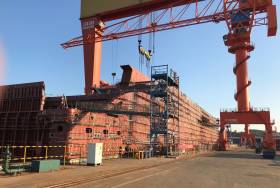Displaying items by tag: Stena EFlexers
All Three New Irish Sea Stena E-Flexers On Schedule and Under Construction in China
#Ferry - Ferry operator Stena Line has reached an important milestone in its major new fleet investment programme with steel-cutting of a third E-Flexer RoPax ship to be deployed on its Irish Sea routes.
This means that all three of Stena Line’s new E-Flexer ships, planned to enter into service on the Irish Sea during 2020 and 2021, are now under construction at the Avic Weihai Shipyard in China.
The first of the new vessels will commence operation on the Holyhead to Dublin route in early 2020, with the remaining two ships to be introduced on the Liverpool to Belfast route in 2020 and 2021.
Stena Line Chief Operating Officer Peter Arvidsson commented: “We are delighted to report that the steel cutting ceremony for the third of our Irish Sea E-Flexer ships has now taken place and that construction is going to plan across all three of our new generation RoPax vessels. Having visited the site several times, we are very impressed with the work being carried out by Stena RoRo, the Avic shipyard and its subcontractors.”
All three Irish Sea E-Flexer vessels will be bigger than today’s standard RoPax vessels at 215 meters long with a freight capacity of 3,100 lane meters and the space to carry 120 cars and 1,000 passengers.
In addition, Stena Line has also ordered a further two E-Flexer RoPax vessels with a larger design, to be deployed within Stena Line’s network in 2022. These larger ships will be 240 meters long with a total freight capacity of 3,600 lane meters, and passenger capacity of 1,200.
“With continued investment in our fleet, we want to lead the development of sustainable shipping and set new industry standards when it comes to operational performance, emissions and cost competiveness,” added Mr Arvidsson.
Stena Line is the largest ferry operator on the Irish Sea, offering the biggest fleet and the widest choice of routes between Britain and Ireland including Liverpool to Belfast, Heysham to Belfast, Cairnryan to Belfast, Holyhead to Dublin and Fishguard to Rosslare, a total of 232 weekly sailings. The company also offers a direct service from Rosslare to Cherbourg with three return crossings a week.
Internationally, Stena Line is one of Europe’s leading ferry companies with 38 vessels and 21 routes in Northern Europe.
The company is an important part of the European logistics network and develops new intermodal freight solutions by combining transport by rail, road and sea.
Stena Line also plays an important role for tourism in Europe with its extensive passenger operations.
The company is family-owned, was founded in 1962 and is headquartered in Gothenburg.
Stena Line is part of the Stena AB Group, which has about 15 000 employees and an annual turnover of around 36.5 billion SEK.





























































